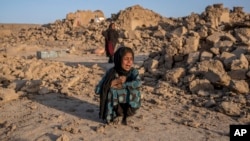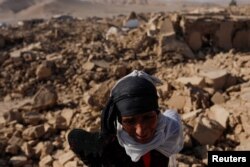Ghulam Ali's wife and daughter are in critical condition after they were pulled from the rubble of their house destroyed in Saturday's earthquake in the western Afghan province of Herat.
"My wife broke her hand, leg and hip; and my daughter is with fractured spine," Ali, a resident of the Zindajan district, told VOA. He said others in the village, including his brother who lost two of his children, were not so lucky as "many were killed."
The United Nations Office for the Coordination of Humanitarian Affairs said Tuesday more than 1,300 people were killed and 500 still are missing following a powerful earthquake on Saturday and multiple aftershocks.
Afghan officials Thursday lowered the death toll from the previously reported 2,000 fatalities to about 1,000. Afghan officials have also reported that more than 2,400 people were injured.
The U.N. said Thursday that more than 90% of those killed in the earthquake were women and children.
The head of the regional hospital of Herat Province said Thursday that most of those admitted to the hospital for injuries were children and women.
"The majority of them were children. Women came in the second number and compared to them, there were fewer men."
The U.N. said the women and children were more likely to be at home in the morning when the earthquake hit.
The provincial Taliban official said that nearly 2,000 houses in 20 villages were destroyed in the earthquakes.
The district of Zindajan, particularly the village of Naib Rafi where Ali was living, was the worst hit area in the province.
"Everything was destroyed when I returned home," said Ali, who was in Herat City, about 2 hours' drive from his village, when the earthquake happened.
"I called my family, and no one answered," he said. "Then, I received a call from someone in the other villages telling me that people from my village approached them for help."
He said that now he, along with his three daughters and two sons, live in a makeshift camp outside Herat.
"Together with those remaining alive from the villages, we are living in tents in an open space outside the city as aftershocks continue," Ali said.
Survivors 'live in fear'
On Wednesday, another quake of the same magnitude hit nearly the same area.
According to the U.N., at least 11,000 people, or 1,835 families, were affected in the districts of Zindajan, Gulran, Kohsan and Kushkd/Rabat-e-Sangai.
Sakhi Ahmad, a resident of Herat City, told VOA that "people are in total shock; they live in fear of another quake; they spend nights sleeping on the streets, parks and nearby deserts."
He added that the aftershocks have created panic among the residents of Herat City and the adjacent districts.
Daniel Timme, chief of communication at UNICEF Afghanistan, told VOA that the aftershocks were forcing people to sleep under open sky.
"Therefore, we are distributing tarpaulin sheets so people can build some basic shelters. We are distributing blankets because it's getting colder already," he said.
Timme said aid organizations are "very concerned' about the potential outbreak of diseases because of the lack of drinking water.
"It is not an easy country to operate in," he said, adding that "people in and around here at the moment have very little to get back onto their feet and they need the assistance of the international community."
Poor roads hamper recovery
Alaa Abouzeid, the World Health Organization's emergency team lead in Afghanistan, told VOA that one of the main challenges is access to the affected communities.
"The challenge is the roads, the condition of the roads, unpaved roads," he said. "Cars, ambulances and trucks take long time to reach the people."
Abouzeid said there were around 200 health facilities in the affected areas and that more than 20 were damaged by the earthquakes.
Abouzeid said that the WHO has deployed teams "for social, psychological and psychiatric" support in the area.
He said they are "helping them [locals] to pass this very hard time, especially those who lost their family members, and there are many of them."
Farkhunda Paimani and Zheela Noori of VOA's Afghan Service contributed to this story, which originated in VOA's Afghan Service.






